Table of Contents
Magnetism is a physical property arising from magnetic fields, which create forces of attraction and repulsion on other objects. These magnetic fields are produced by electric currents and the magnetic moments of particles, influencing other currents and magnetic moments. Ferromagnetic materials, which are highly attracted to magnetic fields and can become permanent magnets, are the most commonly recognized materials that exhibit magnetic properties. Examples of ferromagnetic substances include iron, cobalt, nickel, and their alloys, which are the most prevalent. Less common ferromagnetic materials include rare-earth metals such as neodymium and samarium. The term “ferro-” relates to iron, as magnetism was first observed in lodestone, a natural magnet composed of magnetite (Fe3O4).
A magnetic field is a vector field that illustrates how magnetism affects moving electric charges, electric currents, and magnetic materials. A charge moving through a magnetic field experiences a force perpendicular to both its velocity and the magnetic field. Permanent magnets create magnetic fields that attract ferromagnetic materials, including iron and other magnets. Even “nonmagnetic” materials can experience small forces due to effects like Para magnetism, diamagnetism, and antiferromagnetic, but these forces are generally too weak to detect without specialized equipment. Magnetic fields are also created by electric currents in electromagnets and by changing electric fields. Since the strength and direction of magnetic fields can change across space, they are described mathematically using vector field functions, which assign a vector to every point in space.
Magnetic fields arise from the motion of electric charges and the intrinsic magnetic moments of particles related to their spin, a fundamental quantum property. Magnetic and electric fields are interconnected as part of the electromagnetic force, one of the four fundamental forces of nature. Magnetic fields play a vital role in modern technology, especially in electrical engineering and electromechanics. Rotating magnetic fields are key to the functioning of electric motors and generators. The study of magnetic fields in devices like transformers is known as magnetic circuits. The Hall effect demonstrates the presence of charge carriers in a material via magnetic forces. Earth’s magnetic field protects the planet from solar wind and is essential for navigation using compasses.
Also Check: Important Questions for CBSE Class 12 Physics Magnetic Force and Torque
For Class 12 students studying Physics, Chapter 4 on Moving Charges and Magnetism contains essential questions that are highly recommended for exam preparation. These questions not only help with understanding key concepts but also serve as an excellent tool for quick revision, making them an important part of exam practice.
Moving Charges and Magnetism Important Questions for CBSE Class 12 Physics Magnetic Force and Torque
Also Check: Physical Features of India Class 9 Important Questions Geography Chapter 2
Also Read: CBSE Class 12 Physics Syllabus 2024 | CBSE Class 12 Physics Answer Key 2024
Previous Year Examination Questions CBSE Class 12 Physics Magnetic Force and Torque
1 Mark Questions
1.Using the concept of force between two infinitely long parallel current carrying conductors, define one ampere of current. [All India 2014]
Ans.
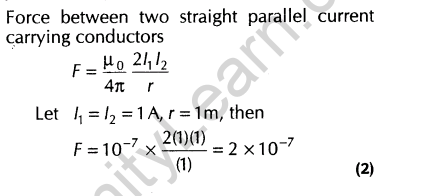
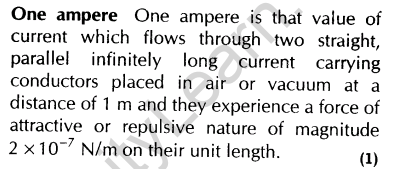
2.Is the steady electric current the only source of magnetic field? Justify your answer.[Delhi 2013 C]
Ans. Yes, the net magnetic force acting on a wire carrying a steady (constant) electric current! in an external magnetic field Band is given F=IdlB

3.Why should the spring/suspension wire in a moving coil galvanometer have low torsional constant? [All India 2008]
Ans. Low torsional constant facilitates greater deflection (allpha) in coil for given value of current and hence, sensitivity of galvanometer increases,
4. Write two factors by which voltage sensitivity of a galvanometer can be increased.[Foreign 2008]
Ans. Voltage sensitivity of galvanometer can be increased by
(i) increasing the magnetic field
(ii) decreasing the value of torsional constant,
5. Write two factors by which current sensitivity of a moving coil galvanometer can be increased. [Foreign 2008]
Ans. Current sensitivity of galvanometer can be increased by
(i) increasing the number of turns of coil.
(ii) increasing the magnetic field.
2 Marks Questions
6.A rectangular coil of sider I and b carrying a current I is subjected to a uniform magnetic field B acting perpendicular to its plane. Obtain the expression for the torque acting on it.[Delhi 2014 C]
Ans.
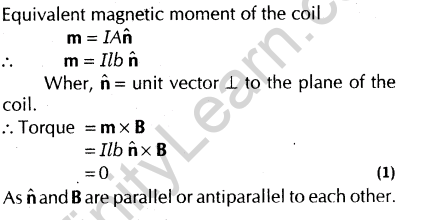
7.A coil of N turns and radius R carries a current /. It is unwound and rewound to make a square coil of side a having same number of turns N. Keeping the current I same, find the ratio of the magnetic moments of the square coil and the Circular COil. [Delhi 2013 C]
Ans.


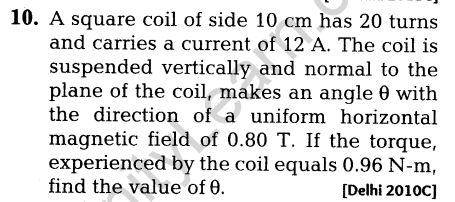
Ans.
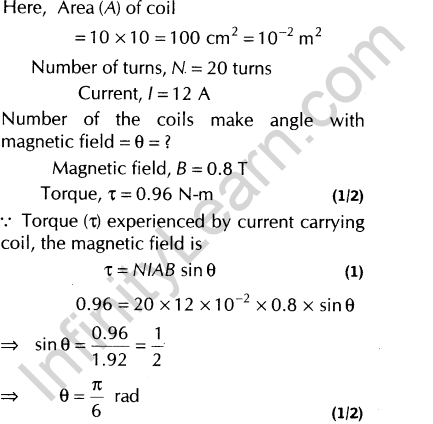

11.Define current sensitivity and voltage sensitivity of galvanometer. Increasing the current sensitivity may not necessarily increase the voltage sensitivity of a galvanometer, justify your answer. [All India 2009]
Ans.
3 Marks Questions
12.A metallic rod of length / is rotated with a frequency v with one end hinged at the centre and the other end at the circumference of a circular metallic ring of radius r about an axis passing through the centre and perpendicular to the plane of the ring. A constant uniform magnetic field B parallel to the axis is present everywhere. Using Lorentz force, explain how emf is induced between the centre and the metallic ring and hence obtained the expression for it.[Delhi 2013]
Ans.
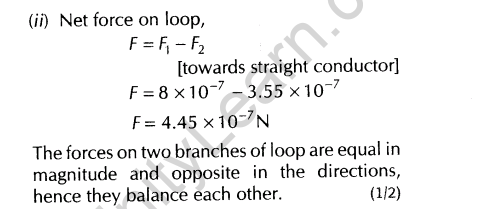
14.Draw a labelled diagram of a moving coil galvanometer and explain its working. What is the function of radial magnetic field inside the coil?[Foreign 2012]
Ans.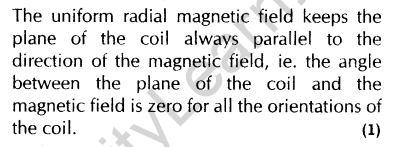
15.Depict the magnetic field lines due to two straight, long, parallel conductors carrying currents 1\ and 12 in the same direction. Hence, deduce an expression for the force per unit length acting on one of the conductors due to the other. Is this force attractive or repulsive? [Delhi 2011 c]
Ans.
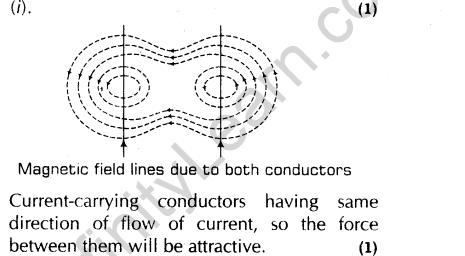
16.Find the expression for magnetic dipole moment of a revolving electron. What is Bohr magneton?
Ans.
17.State the underlying principle of working of a moving coil galvanometer. Write two reasons why a galvanometer cannot be used as such to measure the current in a given circuit. Name any two factors on which the current sensitivity of a galvanometer depends. [Delhi 2010]
Ans.
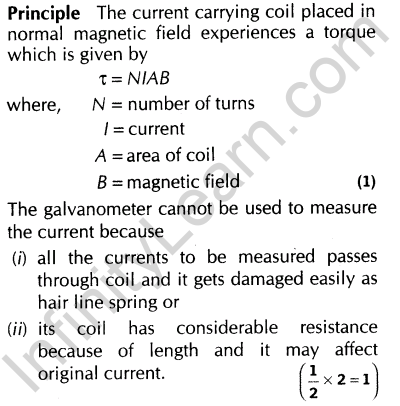
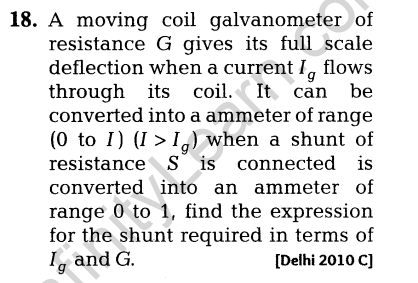
Ans.
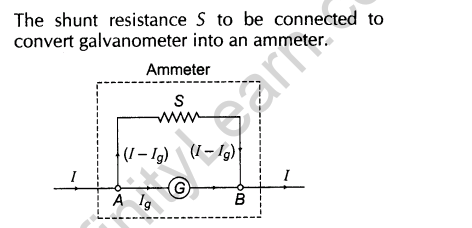
19.Derive the expression for force per unit length between two long straight parallel current carrying conductors. Hence, define one ampere. [Delhi 2009]
Ans.


20.Deduce the expression for the torque experienced by a rectangular loop carrying a steady current I and place’4 in a uniform magnetic field B. In dicate the direction of the torque acting on the loop. [Foreign 2009]
Ans.
Ans.
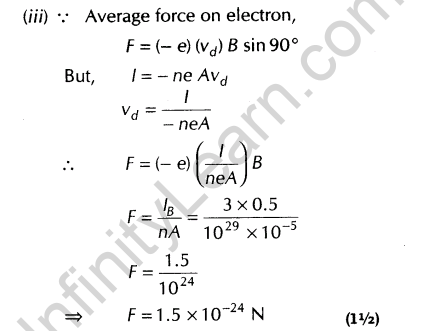
5 Marks Questions
21
(i)Draw a labelled diagram of a moving coil galvanometer. Describe briefly its principle and working.
(ii) Answers the following questions.
(a) Why is it necessary to introduce a cylindrical soft iron core inside the coil of a galvanometer?
(b)Increasing the current sensitivity of a galvanometer may not necessarily increase its voltage sensitivity. Explain giving reasons. [All India 2014]
Ans.(i)

22.(i) State using a suitable diagram, the working principle of a moving coil galvanometer. What is the function of a radial magnetic field and the soft iron core used in it? (ii) For converting a galvanometer into an ammeter, a shunt resistance of small value is used in parallel, whereas in the case of a voltmeter a resistance of large value is used in series. Explain why? [Delhi 2014C]
Ans. (i)

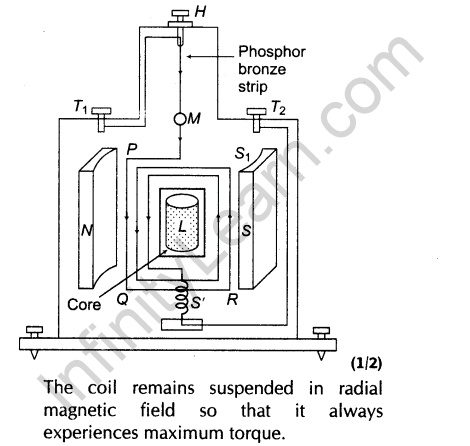
(ii)
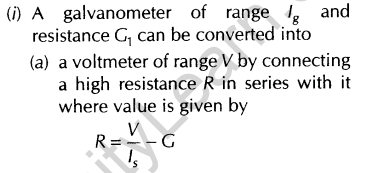
23.(i) Explain giving reasons, the basic difference in converting a galvanometer into (a) a voltmeter and (b) an ammeter.(ii) Two long straight parallel conductors carrying steady currents and I2 are separated by a distance d. Explain briefly with the help of a suitable diagram, how the magnetic field due to one conductor acts on the other. Hence, deduce the expression for the force acting between the two conductors. Mention the nature of this force.[All India 2012]
Ans.

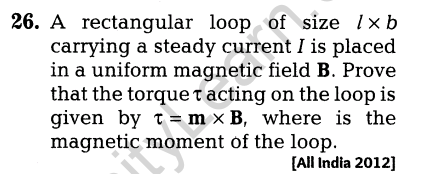
Ans.

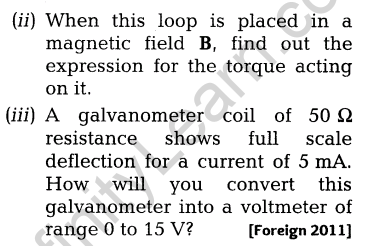
Ans.
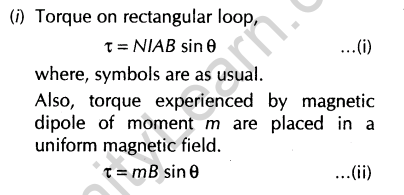
28.(i) With the help of a diagram, explain the principle and working of a moving coil galvanometer.
(ii)What is the importance of radial magnetic field and how is it produced?
(iii)Why is it that while using a moving coil galvanometer as a voltmeter, a high resistance in series is required whereas in an ammeter a shunt is used?[All India 2010; Delhi 2009]
Ans.(i)


30.(i) Two straight long parallel conductors carry currents !x and I2 in the same direction. Deduce the expression for the force per unit length between them. Depict the pattern of magnetic field lines around them.
(ii) A rectangular current carrying loop EFGH is kept in a uniform magnetic field as shown in the figure.
(a) What is the direction of the magnetic moment of the current loop?
(b) What is the torque acting on the loop maximum and zero?
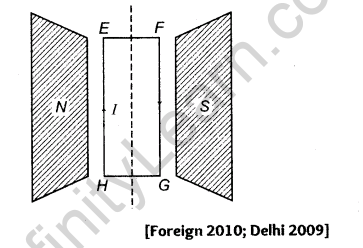
Ans.(i)

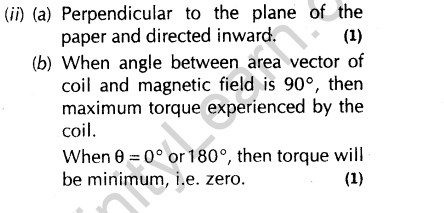
FAQs on Important Questions for CBSE Class 12 Physics Chapter 4
What is Chapter 4 of CBSE Class 12 Physics about?
Chapter 4 is about 'Moving Charges and Magnetism,' which focuses on the magnetic effects of electric currents and the forces on moving charges in magnetic fields.
What are some important topics to focus on in Chapter 4?
Key topics include Biot-Savart law, Ampere’s Circuital law, Lorentz force, motion of charged particles in magnetic fields, and the working of cyclotrons.
What is the significance of Biot-Savart Law in this chapter?
The Biot-Savart law explains how a steady current creates a magnetic field, an essential concept for understanding magnetic effects of currents.
Are numerical problems important for this chapter?
Yes, numerical problems involving magnetic force, field strength, and calculations using the Biot-Savart law and Ampere’s law are crucial for exams.
What type of questions can I expect from this chapter?
You can expect theoretical questions, derivations, and numerical problems based on the concepts of magnetic fields, forces on moving charges, and current-carrying conductors.
Is Lorentz Force important for the exam?
Yes, Lorentz Force is a vital topic, as it explains the force on a charged particle moving in a magnetic field. It is often asked in exams.
How does the chapter connect with real-life applications?
This chapter is essential for understanding devices like electric motors, generators, and cyclotrons, which are widely used in practical applications.
Are there any common derivations asked from this chapter?
Yes, derivations like the magnetic field on the axis of a circular current loop and force between two parallel current-carrying conductors are frequently asked.
What is the importance of cyclotrons in Chapter 4?
Cyclotrons are particle accelerators, and their working principle is based on moving charges in a magnetic field, which is an important concept in this chapter.
How should I prepare for Chapter 4 for board exams?
Focus on understanding concepts, solving numerical problems, and practicing derivations to strengthen your grasp on Chapter 4 for board exams.










